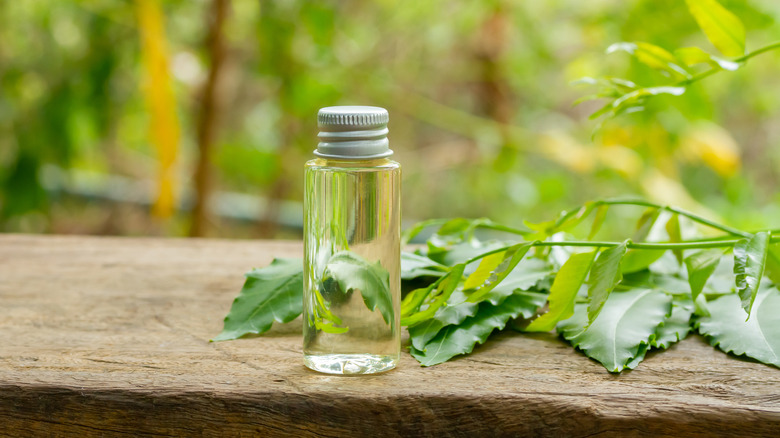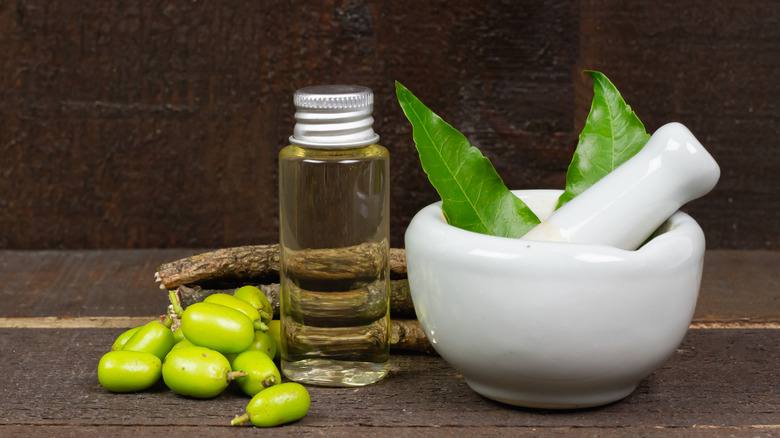Why Neem Oil Is Great For Soothing Eczema
For people with eczema, irritated skin is something they live with. Symptoms of the condition include dry, scaly, or leathery skin, red, itchy patches, and sometimes even bumps, crusting, and swelling. Although inflammation can manifest anywhere in the body, common places include the hands, face, neck, elbows, feet, and the ear and mouth region.
Eczema isn't classified as an autoimmune disease, but it does seem to have a connection with a person's immune system. For starters, people with eczema have reactive and/or sensitive immune systems. Perhaps this is why triggers like environmental allergens and certain kinds of foods cause flare ups that bring on the symptoms. If your family has a history of eczema or dermatitis, you're more at risk for developing the skin condition. Although it isn't contagious, there is no known cure for it. This means that treatment often involves managing the symptoms through medication and topical treatments that have a soothing effect. If you or a loved one has the condition, you probably already know what the triggers are and what kind of sunscreens to use if you have eczema.
Did you also know that it is possible to borrow from ancient Indian Ayurvedic practices when it comes to treatment? Neem oil, derived from the neem plant (also known as Indian lilac), is great for treating eczema. Here's why.
Neem oil is antibacterial and anti-inflammatory, and it's a rich source of antioxidants
Perhaps your only introduction to neem oil was to see (and smell) it from a bottle of hair oil. And yes, the smell can be pungent, but this does not in any way take away from the amazing benefits of this ingredient.
Firstly, neem oil is a great defense against inflammation-causing free radicals because of its rich antioxidant properties. It also works to reduce the itchiness that often arises from eczema triggers like environmental factors and household cleaners because it acts as an antihistamine. And because this plant-based oil derived from tropical countries like India, Pakistan, and Nepal is also antibacterial, anti-fungal and anti-viral in nature, it has a soothing effect on skin that is affected by eczema. In fact, neem oil was found to be an effective medication in combating a known bacteria that commonly occupies skin that's affected by eczema — staphylococcus aureus.
Neem oil is also analgesic, which essentially means that it can act as a pain reliever. And if you've lived with eczema long enough, you probably know how constant itching and/or irritation can lead to sores or wounds that cause pain. When it comes to dry and scaly skin that's often a symptom of eczema, neem oil can help calm things down because it has a good amount of fatty acids, vitamin E, and triglycerides in it.
Here's how you should be using neem oil to treat eczema
In your hunt for the right kind of neem oil to use as a topical treatment, look for the stuff that's organic and cold-pressed. You want an oil that's free of pollutants like chemical fertilizers and insecticides and also one that isn't damaged by heating. As for the color of the product, dark yellow is the right hue. It's best to patch-test the product on your skin to see if you're able to tolerate it, and always blend the oil with another carrier oil or even water before use.
There are a few ways in which you can apply the product to benefit from its soothing properties, one of which includes combining the neem oil with turmeric, honey, and neem powder. Mix together 1 tablespoon of neem powder (which is basically a ground version of neem leaves), 3 drops of neem oil, 1 teaspoon of turmeric powder, and 1 teaspoon of honey in a bowl and gently apply the mixture to the area that's affected by eczema. Leave it on for about half an hour before rinsing it off. The honey in this concoction works to keep your skin moisturized, while the neem and turmeric act as antibacterial agents.
You can make a similar blend using coconut oil or grapeseed oil too. Just make sure you add half and half of the carrier oil and neem oil and apply the concoction to your skin using a cotton ball.

